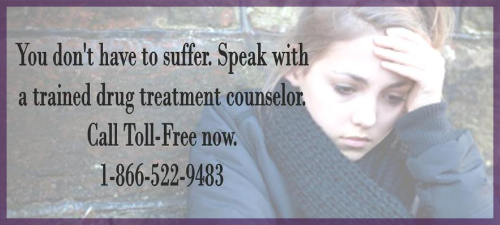Heroin Abuse
- Heroin Abuse Statistics
- Heroin Abuse Overdose
- Methods of Using Heroin
- Side Effects of Heroin Abuse
- Symptoms of Heroin Abuse
- Heroin Effects
- Heroin Abuse Facts
- Heroin Abuse Images
- Heroin Abuse Treatment
- Heroin Abuse and Crime
- Heroin Pictures
- Heroin Street Names
- How is Heroin Made
- How Does Heroin Work
- What is Heroin

Heroin Abuse Treatment
 Heroin abuse treatment is on the increase as more and more people are becoming dependent on this drug. Years of research have shown that abuse and addiction to any drug can be effectively treated. However, there is no single form of heroin abuse treatment that is appropriate for everyone. When getting help for heroin abuse, one must take into account the length of time the drug was used and the specific needs of the individual.
Heroin abuse treatment is on the increase as more and more people are becoming dependent on this drug. Years of research have shown that abuse and addiction to any drug can be effectively treated. However, there is no single form of heroin abuse treatment that is appropriate for everyone. When getting help for heroin abuse, one must take into account the length of time the drug was used and the specific needs of the individual.
A variety of scientifically based approaches to heroin abuse treatment exists. Treatment for heroin abuse can include behavioral therapy (such as counseling, cognitive therapy, or psychotherapy), medications, or a combination of both. Behavioral therapies offer people strategies for coping with their drug cravings, teach them ways to avoid drugs and prevent relapse, and helps them deal with relapse if it occurs. The best heroin abuse treatment programs provide a combination of therapies and other services to meet the needs of each patient. These needs are shaped by issues such as age, race, culture, sexual orientation, gender, pregnancy, parenting, housing, and employment.
Heroin abuse treatment is similar to the recovery of most addictive drugs. Recovery from heroin abuse is a long process and almost always requires help from trained professionals. People recover from heroin abuse every single day, but they rarely do it alone. The highest documented success rates for heroin abuse treatment and recovery are through long term drug rehabilitation lasting at least 3 to 6 months. This gives structure and support to provide long term recovery from heroin abuse.
There are a wide range of programs for heroin abuse treatment. For many, attending a rehab program is the best choice. Other forms of treatment include methadone, LAAM, and buprenorphine. These other forms of heroin abuse treatment have found some success. However, they are simply replacing the abuser's heroin use with another form of drug use. As silly as it sounds, this is a common approach for many rehabilitation programs. The point here is that a heroin rehab should be found that uses no replacement drug treatment of any kind. These programs are very scarce so it is important to ask whether the heroin abuse treatment program you are interested in makes use of these techniques.
Initially the heroin abuser will go through a detoxification process as part of their heroin abuse treatment. This is only part of the initial steps of recovery; many individuals misinterpret this vital step as the "only" step and feel that they have accomplished their goal of heroin abuse recovery. After detoxification the recovering heroin abuser must learn life's lessons and come to an understanding of why they began to use drugs.
There are many steps that follow detoxification and each heroin abuse treatment center will go through them at a different pace. The recovering heroin abuser needs to be willing to participate in the rehabilitation program and continually make an effort daily. The appropriate duration for an individual in heroin abuse treatment depends on his or her problems and needs. Research indicates that for most patients, the threshold of significant improvement is reached at about 3 months in treatment. After this threshold is reached, additional care can produce further progress toward recovery. There are no quick fixes for heroin abuse. The knowledge and life skills one learns during intensive heroin abuse treatment must be integrated into everyday life.
